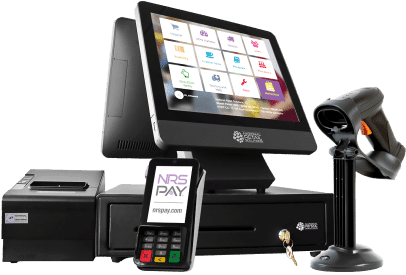POS Systems for Retail:
Your
All-in-One Solution
for Total
Store
Management
boost sales, and
enhance
customer experience.
What is a Retail POS System?

Software Component
- Acts as the system’s brain, handling transaction processing, inventory management, sales reporting, and customer data management.
- Ranges from basic setups for small retailers to advanced, feature-rich platforms for larger chains.
Hardware Components
- Includes essential devices like barcode scanners, receipt printers, cash drawers, and card readers.
- Facilitates the physical execution of sales, such as scanning items, printing receipts, and processing payments.
Integration and Flexibility
- Often compatible with mobile devices and cloud-based services, allowing for versatile use and real-time data access.
- Enhances operational flexibility and efficiency in various business environments.
Impact on Retail Experience
- Streamlines sales processes, making transactions quicker and more efficient for staff and customers.
- Provides valuable insights into business performance, aiding in strategic decision-making.
Key Features of Retail POS Systems
to focus on what you do best. With NRS Purple, you can streamline your payroll
process, ensure accuracy, and easily stay compliant.
Sales Recording
One of the primary functions of a POS is to record transactions. This feature allows businesses to track sales and generate analysis reports.
Inventory Management
It provides real-time tracking of inventory levels, helping businesses make informed decisions about restocking. It can also automate tasks like reordering products when they reach a certain threshold.
Customer Relationship Management (CRM)
POS registers often include CRM features that allow businesses to collect and analyze customer data. It can help businesses understand their customers' buying habits and preferences, enabling them to tailor their marketing efforts accordingly.
Payment Options
Modern sales terminals support various payment methods, including credit and debit cards, mobile payments, and online payment platforms. This flexibility can enhance the customer experience by offering convenient payment options.
Omnichannel Integration and Ecommerce
This feature allows businesses to integrate their in-store and online sales, providing a seamless shopping experience for customers. It can also help businesses manage their inventory more effectively by automatically updating stock levels across all sales channels.
Reporting and Analytics
Retail POS systems for small businesses often include robust reporting and analytics tools. These can generate sales reports, track performance metrics, and provide insights into customer behavior, helping businesses make informed decisions.
Employee Management
Some sales terminals include features for managing employee schedules, tracking hours, and syncing data with payroll software.
NRS POS
Benefits of NRS Retail POS Systems
Our Retail POS Systems are designed to make running a business more accessible and efficient. From speeding up transactions to managing inventory and understanding customer habits, our solutions provide the tools you need to succeed in the competitive market.

Easy-to-Use Touch Screen Interface:
- The touch screen is user-friendly, making it easy for staff to learn and use.
- Speeds up the checkout process, keeping lines moving and customers happy.
Built-in Customer Loyalty Program (BR Club):
- Attracts and retains customers by offering special deals and discounts.
- It helps you create a loyal customer base that keeps coming back.
Robust Sales and Inventory Tracking:
- Tracks what’s selling and what's not so you can make smart stocking decisions.
- Alerts you when inventory is low, ensuring you always have popular items.
Comprehensive Reporting and Analytics:
- Provides detailed reports to help you understand your business better.
- Use these insights to plan sales strategies and improve overall performance.
Remote Management Capabilities:
- Manage your store from anywhere using the NRS app or web portal.
- Check sales, inventory, and more, even when you’re not at the store.
Multi-Location Support:
- Ideal for businesses with more than one location.
- Ensures consistency and easy management across all your stores.
Integrated Credit Card Processing (NRS Pay):
- Offers competitive rates for credit card processing, saving you money.
- It comes with a free card reader, making it easy to accept card payments.
Scalability:
- Built to grow your business, from small shops to larger chains.
- Offers flexible options that cater to the evolving needs of a growing business, ensuring that as your customer base and inventory expand, your POS system for retail stores can handle the increase efficiently.
Security and Reliability:
- Keeps your business data and customer information secure.
- A reliable terminal means less downtime and more selling time.
See What Our Customers Are Saying
About NRS POS










Why Choose NRS for Retail POS Solutions?
We provide an all-in-one system with a merchant screen, a customer-facing display, a secure cash drawer, an efficient barcode scanner, and a high-speed receipt printer, making it simple for users to navigate.
"*" indicates required fields
